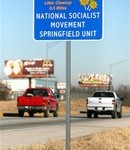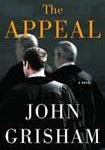“Well, a satirical piece in the Times is one thing, but bricks and baseball bats really get right to the point.”

So said Woody Allen (as Isaac Davis in Manhattan) in response to the suggestion that a Nazi march was “devastated” by a mocking piece in the New York Times.
In Sunday’s Times, there was an article about a group calling themselves “The Nationalist Socialist Movement – Springfield Unit.” It has been allowed to participate in Missouri’s adopt-a highway program. Under the program, a group agrees to pick up trash along a stretch of roadside and, in return, a sign is erected at the onset of the “adopted” segment, acknowledging their participation. The Nazis apparently pick up litter in full regalia.
What to do? Allen’s character suggested picking up bricks and baseball bats and going to “really explain things to them.” Let’s take that off the table.
There is no question that the Nazis have a right to participate. The Supreme Court has held that groups may not be excluded from such programs on the basis of their political beliefs. That case (also arising from Missouri) involved adoption of a highway by the Klu Klux Klan. State officials responded by renaming the road after Rosa Parks.
Legislators have proposed calling the highway on which the Nazis collect trash, the Abraham Joshua Heschel Memorial Highway after the prominent rabbi and philosopher.Although Heschel’s daughter is not happy with the proposal (and her wishes are entitled to great consideration), I sort of like it. Absent the preferred option, i.e., that such people not exist, there is something about having Nazis pick up the garbage on what is, symbolically, a Jew’s road. “Excuse me, there, Horst, but I think you missed that Toblerone wrapper. Be a good little Aryan and pick that up for me.”
I appreciate that people will look at the propriety of such a response in different ways. One argument would be, I suppose, that to do anything more draws attention to the Nazis. But fanatics have a way of drawing attention to themselves. I prefer to see honoring Heschel in the face of these jamokes as the wages of hatred. The Nazis are marginalized and Heschel, who barely escaped the charnel house, is honored.
But this is the faculty blog so let’s explore a legal point.

 In a comment following Ed Fallone’s post on Chief Justice Robert’s little list (actually it as a rather long list), he argues that there is little in the text, structure and history of the Bill of Rights that might inform the question of when the due process clause requires a judge to recuse herself because of the potential for bias associated with campaign contributions:
In a comment following Ed Fallone’s post on Chief Justice Robert’s little list (actually it as a rather long list), he argues that there is little in the text, structure and history of the Bill of Rights that might inform the question of when the due process clause requires a judge to recuse herself because of the potential for bias associated with campaign contributions: